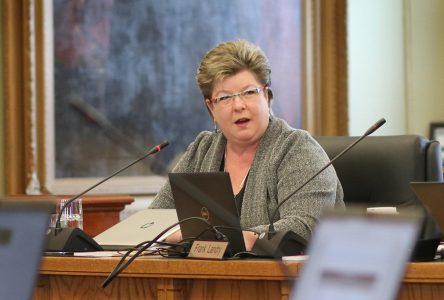CORNWALL, Ontario – A large crowd gathered at the old General Vanier school in Cornwall on Monday night to hear representatives of rural schools make their case against the school board’s plan to shut them down.
On Sept. 28, the Upper Canada District School Board (UCDSB) presented their draft Peer Accommodation Review which called for the closure of 12 schools by the end of June 2017 with more closures possible depending on funding.
Many of the schools proposed for closure are in rural communities, such as Longue Sault Public School, Char-Lan District High School, Glengarry District High School and others.
Some schools, like Rothwell-Osnabruck would be transformed into a K-6 school with students in Grade 7 and above sent outside of their rural community to CCVS or St. Lawrence Secondary School in Cornwall.
Whenever school closures are proposed the school board sets up an Accommodation Review Committee (ARC) to hear feedback from affected schools. The ARC heard presentations from nine delegations Monday night, none of whom were in support of the UCDSB draft proposal.
“The impact on rural communities was removed from consideration by the board, but how can they ignore the economic impact of those who pay taxes to the school board,” asked Township of North Glengarry Councillor Jeff Manley, the first person to speak to the ARC.
Manley announced to the crowd that the Township of North Glengarry had commissioned Doyle Tech to conduct a study of what the impact of the closure of Maxville Public School and Glengarry District High School would be on their communities.
Although the study is not yet complete, Manley stated that the annual loss of revenue to Alexandria will be $5 million a year and that property values in the community would plummet by 20 percent.
South Glengarry Mayor Ian McLeod denounced the timetable being imposed on the communities as being unworkable and detrimental to finding an alternative solution.
“We need more time to determine the best method to go forward,” he said. “That is why the United Counties are asking for a one-year moratorium on the entire process.”
Peter Young, the Economic Development Officer for South Stormont, said that the UCDSB’s plan was pulling the rug out from under the counties and would hurt their future plans for growth.
Young told the ARC that the communities of Long Sault and Ingleside were built around the schools in those communities. He then went on to explain that the communities were seeing an influx of growth which would be curtailed if the schools are lost.
Young then made reference to the Provincial Policy Statement, which he pointed out promised to protect and encourage growth in rural communities, something that was being contravened by the UCDSB school closure plan.
Martin Lang spoke on behalf of the Glengarry Agricultural Federation and made the case that not only would this move hurt communities, but will hurt students as well by taking them away from their homes.
“We need those students in rural communities,” he said. “Being a farmer is a long term apprenticeship, you start as soon as you can and help where you can and continue until you are ready to take over. And more than that,” he continued. “We need these young people to take our place in our community, they need to replace me in the volunteer Fire Department.”
Former Stormont, Dundas and South Glengarry MPP Jim Brownell told the ARC that he felt his grandchildren were being used to satisfy a political agenda that favoured larger schools in cities.
“I’m sick of our children and grandchildren being used as pawns to the whims of the Ministry of Education and the Upper Canada District School Board,” he said.
One resolution that was presented to the ARC during the meeting came from Todd Rozon representing the Save Char-Lan committee.
The plan he presented to keep Char-Lan open would involve merging Williamstown Public School and Char-Lan District High School into a single campus Grade K-12 school and close SJ McLeod and consolidating it with the new unified school.
Rozon said that according to a survey conducted by the Save Char-Lan committee 91 percent of respondents were in favour of this solution and 82 percent opposed busing kids to schools in Cornwall.
Angus McRae and Nick Danaher, two Char-Lan Grade 12 students were the last to present to the ARC and were the only ones able to give a student’s perspective.
They said their parents moved to the community so that their kids could go to rural schools and how Char-Lan fit their needs by being a small, friendly school in the heart of Williamstown, near the store and the pub.



